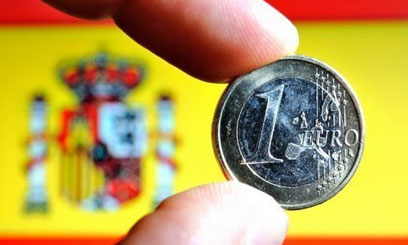
A euro coin held before the Spanish flag. The euro came under fresh pressure in early trading Tuesday as fears over the health of the common currency resurfaced following initial euphoria over a rescue deal for struggling Spanish banks. © AFP/File Philippe Huguen
MADRID, Jun 12 – The euro came under fresh pressure in early trading Tuesday as fears over the health of the common currency resurfaced following initial euphoria over a rescue deal for struggling Spanish banks.
On Monday the markets had enjoyed a brief bounce as they reacted to the weekend news that Spain’s eurozone partners had agreed to extend up to 100 billion euros ($125 billion) to salvage a banking sector weakened by reckless lending to a property market that crashed in 2008.
That bounce had disappeared by the close of play and on Tuesday markets in Asia opened in determinedly negative mood amid fears that the deal to shore up Spanish banks would not be enough to avert catastrophe in the eurozone.
The common currency, which rose past $1.26 in Asian trade Monday, bought $1.2480 early Tuesday.
Tokyo stocks fell 1.28 percent by noon and Hong Kong opened 0.85 percent lower, as oil prices dipped further.
The bank rescue scheme, which represented a U-turn by Madrid, was designed to ease concern about the risk of a Spanish financial sector calamity, but the sheer size of the loan fed anxiety over the country’s fast-growing public debt.
The EU’s internal market commissioner Michel Barnier adopted a defiant tone, saying the rescue deal is a sign of rising confidence in Europe.
“Confidence is starting to return among Europeans,” Barnier said at the opening of the International Economic Forum of the Americas in Montreal.
His boss, EU Commission chief Jose Manuel Barroso, called Tuesday for the setting up of a a cross-border authority to supervise European banks, providing bloc-wide deposit cover and a rescue pot funded by taxes on financial institutions.
Barroso, speaking in Tuesday’s Financial Times newspaper, said such an ambitious plan could be realised by next year without the need for existing treaties to be changed.
“There is now a much clearer awareness among European member states about the need to go further in terms of integration, especially in the euro area. This is one lesson of the crisis,” he told the business daily.
Barnier told AFP that taking steps toward tighter integration would be “absolutely essential” for the eurozone, and that the measures would be proposed to other EU members.
“We are at a moment of truth” in terms of European integration, he said. “The choice is whether we go further or we go back” in the face of protectionism.
Recent proposals for a so-called banking union would involve giving the EU commission more power in controlling national budgets and therefore requiring governments to cede some sovereignty.
After an initial warm welcome by the markets, the atmosphere turned nasty for both Spain and Italy on the fear that Sunday’s elections in Greece could mean Athens quitting the euro, with unknown consequences.
Spain’s 10-year government bond yields eased at first on Monday, but by mid-afternoon they had surged to 6.508 percent — well above Friday’s close of 6.216 percent before the eurozone agreement.
Italy’s yield leapt to 6.035 percent from 5.77 percent.
Spain’s risk premium — the extra rate investors demand to hold its bonds over their safer German counterparts — shot to 5.20 percentage points after closing last week at 4.89 percentage points.
A rally on the Madrid stock market also wilted. After soaring by 5.93 percent in opening trade Monday, the IBEX-35 index of leading shares ended 0.54 percent lower.
Daniel Pingarron Salazar, market strategist at IG Markets, said the lack of details over the Spanish banking rescue fed doubts, with the size and full conditions still unknown.
It is also still unclear whether the eurozone bailout will tap the incoming bailout fund, the European Stability Mechanism (ESM), whose debt takes priority for repayment over ordinary investors in a time of crisis.
The big spectre, however, is Greece, and the fear that anti-austerity party Syriza will win elections on Sunday.
An election victory for parties opposed to the austerity measures imposed by the EU and IMF in exchange for two multi-billion euro bailout packages “would mean Greece not complying with its rescue plan from July last year, and then there is a major possibility of Greece having to abandon the euro,” Pingarron said.
“That is what is causing this enormous fear not only in the Spanish market but also in the American market, which has slumped.”
A formal request by Spain for the agreed rescue loan is expected by the next eurozone finance ministers meeting scheduled for June 21.
The final figure will be known after the European Union, European Central Bank and IMF finish a review of the situation, and a formal accord will then be signed, he said.
Spain’s Prime Minister Mariano Rajoy told reporters Sunday that the deal ensured “the credibility of the euro” and insisted that rather than buckling to pressure for the rescue, he had sought it all along.


































